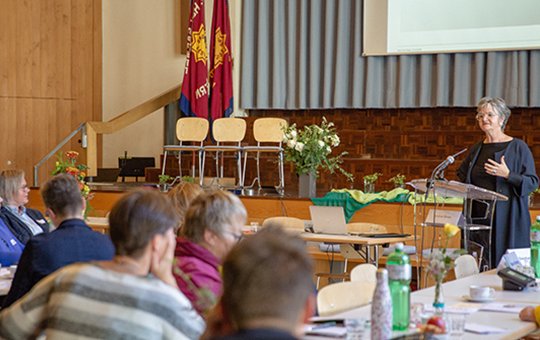“This is undisputedly a current issue in the church context. It affects and engages women and men in our churches,” stated the President of the FSPC Women’s Conference, Sabine Scheuter.
In Christian tradition, sexuality was for a long time equated with sin and thus for the most part severely restricted and oppressed. It rarely was valued as a positive, life-affirming force and openly included in church discourse as a natural part of life.
Ruth Pfister, a member of the FSPC Council, said in her welcome address: “Sexuality is a basic dimension of human life that can be a part of successful relationship building.” In her welcome address, she invited listeners to think about how this life-affirming and relationship-shaping aspect of sexuality could have a place in church life – in pastoral care, in religious education, but also in worship services and sermons. She emphasized that it was just as important to openly address conflict-laden aspects: Wherever autonomy or respect are violated in intimate relationships, the churches must stand up for those who are affected or at risk.
The keynote speech by Prof. Dr. Andrea Bieler outlined theological thoughts on desire, good and bad sex, and gender diversity. The professor of practical theology at Basel University stated that “when it comes to the topic of sex, the churches are still dominated by a discourse of regulation. This means that the question is mostly whether something is permitted or not. We are not asking enough questions about how we actually perceive our own actions and behavior. Here, the church’s educational work could have the function of building awareness of sexuality in its beauty and in its ambiguity.”
Other current topics such as prostitution, #MeToo and gender were discussed in the afternoon workshops. They were conducted by pastor Ivana Bendik, theologian Stephan Jütte and the Director of the feminist Christian Peace Organization cfd, Carmen Meyer.
The topic of sexual ethics will continue to be explored and shows “how open to debate the Protestant Reformed Churches are,” said Ruth Pfister.
